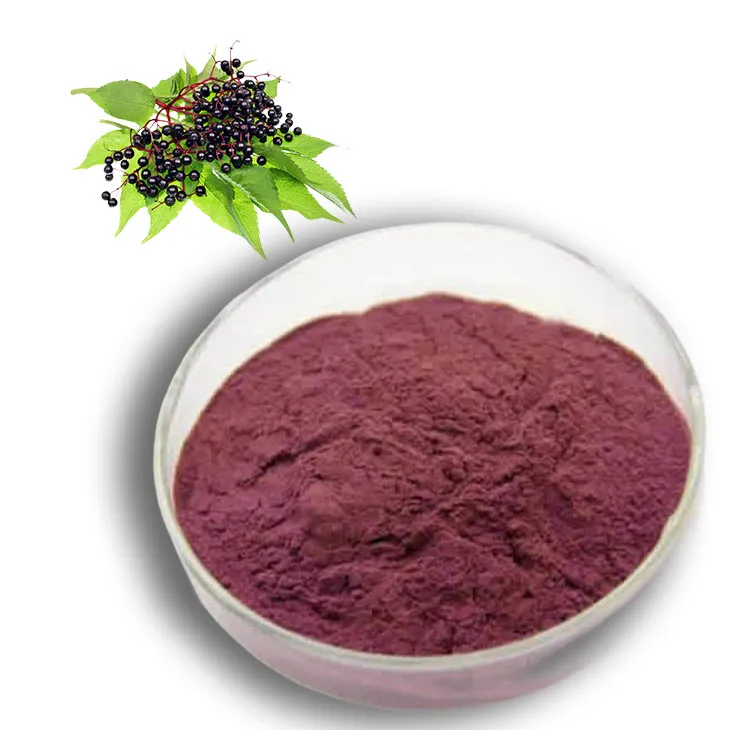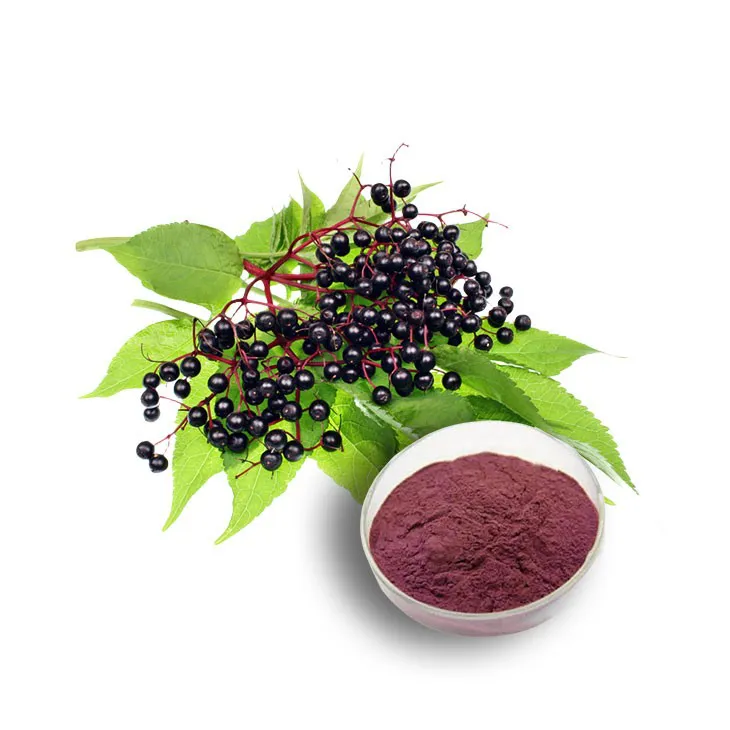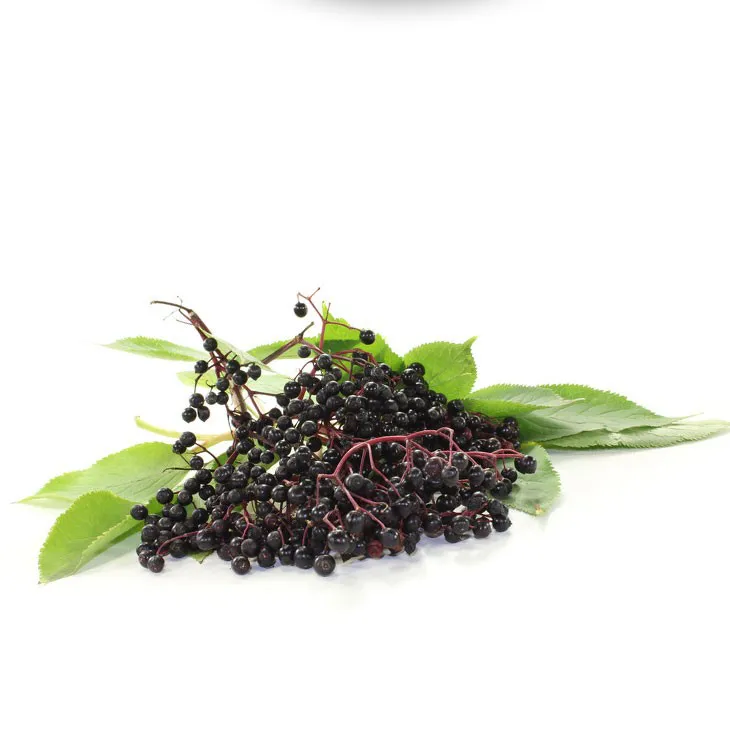- 0086-571-85302990
- sales@greenskybio.com
5 Benefits of Elderberry Extract + Dosage, Side Effects
2024-11-12

1. Introduction
Elderberry Extract has been used for centuries in traditional medicine. Derived from the elderberry plant, this natural extract is gaining popularity in modern health and wellness circles. It is rich in vitamins, antioxidants, and other beneficial compounds. In this article, we will explore the five main benefits of Elderberry Extract, as well as discuss proper dosage and potential side effects.

2. Benefits of Elderberry Extract
2.1 Boosts the Immune System
One of the most well - known benefits of elderberry extract is its ability to boost the immune system. The extract contains high levels of antioxidants, such as anthocyanins, which help to protect the body's cells from damage caused by free radicals.
- These antioxidants also play a role in enhancing the immune response. They can stimulate the production of cytokines, which are proteins that help regulate the immune system.
- Elderberry extract has been shown to increase the activity of white blood cells, which are crucial for fighting off infections. For example, in a study, participants who took elderberry extract had a significant reduction in the duration and severity of cold and flu symptoms compared to those who did not take the extract.
2.2 Anti - Inflammatory Properties
Elderberry extract also has anti - inflammatory properties. Chronic inflammation is associated with many health problems, including heart disease, diabetes, and arthritis.
- The anthocyanins in elderberry extract have been found to reduce inflammation by inhibiting the production of inflammatory mediators such as prostaglandins and cytokines.
- This anti - inflammatory effect can help relieve symptoms in conditions like arthritis. For instance, some patients with rheumatoid arthritis have reported a reduction in joint pain and swelling after taking elderberry extract regularly.
2.3 Antiviral Effects
The antiviral effects of elderberry extract are another significant benefit. It has been shown to be effective against a variety of viruses, including the influenza virus.
- The extract can prevent viruses from attaching to and infecting cells in the body. It does this by binding to the virus's surface proteins, which inhibits the virus's ability to enter cells.
- In addition, elderberry extract can stimulate the immune system to produce antibodies against the virus, helping the body to fight off the infection more effectively. Several studies have demonstrated its effectiveness in reducing the duration and severity of viral infections.
2.4 Improves Heart Health
Elderberry extract may also improve heart health. It can help lower blood pressure, which is a major risk factor for heart disease.
- The antioxidants in the extract can prevent oxidative stress in the blood vessels, which helps to keep them healthy and flexible. This, in turn, can reduce the risk of atherosclerosis, a condition in which the arteries become narrowed and hardened.
- Additionally, elderberry extract may help to lower cholesterol levels. By reducing LDL (bad) cholesterol and increasing HDL (good) cholesterol, it can contribute to a healthier lipid profile and better heart health.
2.5 May Have Anti - Cancer Properties
There is some evidence to suggest that elderberry extract may have anti - cancer properties. While more research is needed in this area, early studies are promising.
- The antioxidants in the extract can prevent DNA damage, which is a key step in the development of cancer.
- Some in - vitro studies have shown that elderberry extract can inhibit the growth of cancer cells. However, it is important to note that these studies do not necessarily translate to the same effects in humans, and more research, including clinical trials, is required to fully understand the potential anti - cancer benefits of elderberry extract.

3. Dosage of Elderberry Extract
The appropriate dosage of elderberry extract can vary depending on several factors, such as age, health condition, and the form of the extract (e.g., syrup, capsule, or tincture).
- For adults, a typical dosage of elderberry syrup is around 1 - 2 teaspoons (5 - 10 ml) daily. This can be taken straight or diluted in water or juice.
- When using elderberry capsules, the recommended dosage is usually 300 - 500 mg per day.
- For tinctures, the dosage may range from 1 - 3 ml per day.
- It is important to follow the instructions on the product label or consult a healthcare provider, especially if you have any underlying health conditions or are taking other medications.

4. Side Effects of Elderberry Extract
While elderberry extract is generally considered safe for most people, there are some potential side effects to be aware of.
- Digestive Issues: Some people may experience mild digestive problems such as nausea, vomiting, or diarrhea after taking elderberry extract. This is more likely to occur if the extract is taken in large doses or on an empty stomach.
- Allergic Reactions: Although rare, allergic reactions to elderberry extract can occur. Symptoms may include itching, rash, swelling, or difficulty breathing. People who are allergic to other plants in the same family as the elderberry (such as Sambucus nigra) should be especially cautious.
- If you experience any unusual or severe side effects after taking elderberry extract, it is important to stop using it immediately and seek medical attention.
5. Conclusion
Elderberry extract offers a range of potential health benefits, from boosting the immune system to improving heart health. However, it is important to use it properly and be aware of the potential side effects. By following the recommended dosage and consulting a healthcare provider if necessary, you can safely incorporate elderberry extract into your wellness routine.
FAQ:
What are the main benefits of Elderberry extract?
Elderberry extract has several main benefits. It is known for its immune - boosting properties, which can help the body fight off infections. It also has antioxidant effects, protecting cells from damage caused by free radicals. Additionally, it may have anti - inflammatory properties, potentially reducing inflammation in the body. Another benefit is its potential to relieve cold and flu symptoms, such as reducing the duration and severity of symptoms. Finally, it may support overall respiratory health.
How should Elderberry extract be dosed?
The proper dosage of Elderberry extract can vary depending on factors such as age, health condition, and the form of the extract (e.g., syrup, capsule). For adults, a common dosage is around 15 - 30 ml of elderberry syrup per day, or as directed by a healthcare provider. For children, the dosage is typically lower, usually adjusted based on their age and weight. When using capsules, the dosage instructions on the product label should be followed carefully. However, it is always best to consult a healthcare professional for personalized dosage recommendations.
What are the potential side effects of Elderberry extract?
While Elderberry extract is generally considered safe for most people, there can be some potential side effects. Some individuals may experience mild digestive issues such as nausea, vomiting, or diarrhea. In rare cases, allergic reactions can occur, especially in those who are allergic to other plants in the same family. It is important to stop using the extract if any adverse reactions are noticed and seek medical advice if necessary.
Can Elderberry extract be used during pregnancy?
There is not enough conclusive evidence to determine the safety of using Elderberry extract during pregnancy. Some healthcare providers may recommend avoiding it during pregnancy due to potential unknown risks. Pregnant women should always consult their obstetrician or healthcare provider before using any herbal supplements, including Elderberry extract.
Is Elderberry extract effective for preventing colds?
There is some evidence to suggest that Elderberry extract may help prevent colds. Its immune - boosting properties may enhance the body's natural defenses against viruses that cause colds. However, it is not a substitute for other preventive measures such as good hygiene practices (e.g., hand washing), a balanced diet, and regular exercise. More research is needed to fully confirm its effectiveness in cold prevention.
Related literature
- The Health Benefits of Elderberry Extract: A Review"
- "Elderberry Extract: Dosage, Efficacy, and Safety Considerations"
- "Potential Side Effects of Herbal Supplements: A Focus on Elderberry"
- ▶ Hesperidin
- ▶ citrus bioflavonoids
- ▶ plant extract
- ▶ lycopene
- ▶ Diosmin
- ▶ Grape seed extract
- ▶ Sea buckthorn Juice Powder
- ▶ Beetroot powder
- ▶ Hops Extract
- ▶ Artichoke Extract
- ▶ Reishi mushroom extract
- ▶ Astaxanthin
- ▶ Green Tea Extract
- ▶ Curcumin Extract
- ▶ Horse Chestnut Extract
- ▶ Other Problems
- ▶ Boswellia Serrata Extract
- ▶ Resveratrol Extract
- ▶ Marigold Extract
- ▶ Grape Leaf Extract
- ▶ blog3
- ▶ blog4
- ▶ blog5
-
Organic Tongkat Ali extract powder factory.
2024-11-12
-
How to make powder with ashwagandha extract.
2024-11-12
-
Rosehip extract manufacturers from China.
2024-11-12
-
The best cat's claw extract in nature.
2024-11-12
-
Chinese Dandelion Leaf Extract Suppliers.
2024-11-12
-
Tongkat Ali Extract Powder
2024-11-12
-
Lemon Balm Extract
2024-11-12
-
Peppermint Extract Powder
2024-11-12
-
Mulberry leaf Extract
2024-11-12
-
Lotus leaf extract
2024-11-12
-
Kidney Bean Extract
2024-11-12
-
Uridine-5'-monophosphate Disodium salt
2024-11-12
-
Cocoa Extract
2024-11-12
-
Yellow Pine Extract
2024-11-12
-
Sea buckthorn oil
2024-11-12





















